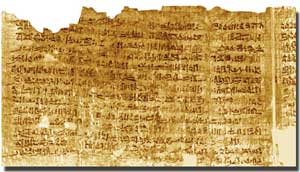Cross-posted at God Is For Suckers!
I discovered this link via a blogversation with a Muslim on the NGB - and a lot of the nonsense contained therein was/is pretty funny.
One of the more amusing (as well as sadder) points, is that most Muslims are unaware that the Old Testament has been pretty thoroughly debunked in re: historicity.
The Exodus, that seminal event of Judaism, never occurred. Simple as that. That Islam has been built on the backbone of Judaism makes Islam even simpler to refute.
But of course, like their Christian counterparts, they seize upon some obscure parchment (presupposition firmly entrenched) as proof of the non-event.
I speak of the Ipuwer papyrus.
The first link provided says this:
"The details in the papyrus regarding the disasters that struck the people of Egypt are just as described in the Qur'an. In the Qur'an, we are told about these catastrophes. This Islamic account of this period of human history has been confirmed by the discovery in Egypt, in the early 19th century, of the Ipuwer papyruses dating back to the Middle Kingdom. After the discovery of this papyrus, it was sent to the Leiden Dutch Museum in 1909 and translated by A. H. Gardiner, a prominent scholar of ancient Egypt. In the papyrus were described such disasters in Egypt as famine, drought and the fleeing of the slaves from Egypt. Moreover, it appears that the writer of the papyrus, one Ipuwer, had actually witnessed these events."
But the second link (the answers.com entry) stipulates this instead:
"The sole surviving manuscript dates to the later 13th century BCE ( No earlier than the 19th dynasty in the New Kingdom). Egyptologist Dr Halpern believed that the papyrus was a copy of earlier copy in the Middle kingdom. The dating of the original composition of the poem is disputed, but several scholars, have suggested a date between the late 12th dynasty and the Second Intermediate Period (ca. 1850 BCE - 1600 BCE).[3] The theme of this work has previously been taken either as a lament inspired by the supposed chaos of the Second Intermediate Period, or as historical fiction depicting the fall of the Old Kingdom several centuries earlier, or possibly a combination of these.
Ipuwer describes Egypt as afflicted by natural disasters and in a state of chaos, a topsy-turvy world where the poor have become rich, and the rich poor, and warfare, famine and death are everywhere. One symptom of this collapse of order is the lament that servants are leaving their servitude and acting rebelliously. Because of this, and such statements as "the River is blood", some have interpreted the document as an Egyptian account of the Plagues of Egypt and the Exodus in the Old Testament of the Bible, and it is often cited as proof for the Biblical account by various religious organisations."
And this website provides a (nearly) full translation. It also says this:
It is impossible to give a date for the composition of this document. The surviving papyrus (Papyrus Leiden 334) itself is a copy made during the New Kingdom. Ipuwer is generally supposed to have lived during the Middle Kingdom or the Second Intermediate Period, and the catastrophes he bewails to have taken place four centuries earlier during the First Intermediate Period.
On the other hand, Miriam Lichtheim, following S. Luria, contends thatthe 'Admonitions of Ipuwer' has not only no bearing whatever on the long past First Intermediate Period, it also does not derive from any other historical situation. It is the last, fullest, most exaggerated and hence least successful, composition on the theme "order versus chaos."
M. Lichtheim, Ancient Egyptian Literature, Volume I, p.150
Fringe historians often compare the content of this papyrus with Exodus, the second book of the Bible [1]. Similarities between Egyptian texts and the Bible are easily found, and it is reasonable to assume Egyptian influence on the Hebrews, given their at times close contacts. But to conclude from such parallelisms that the Ipuwer Papyrus describes Egypt at the time of the Exodus, requires a leap of faith not everybody is willing to make.
Five minutes on the Internet, and it flies about the room like an inflated, untied balloon, and comes to rest wrinkled on the floor.
So there you have it. An obscure piece of papyrus, nigh well undateable, with no mention of the Israelites outside of some brief references to foreigners, the alleged 'plagues' easily attributable to volcanic activity (we'll just skip the 'forty years of travel' bit - it's WAY too ludicrous); let's just call it a wrap, it's a load of crap.
Til the next post, then.















No comments:
Post a Comment